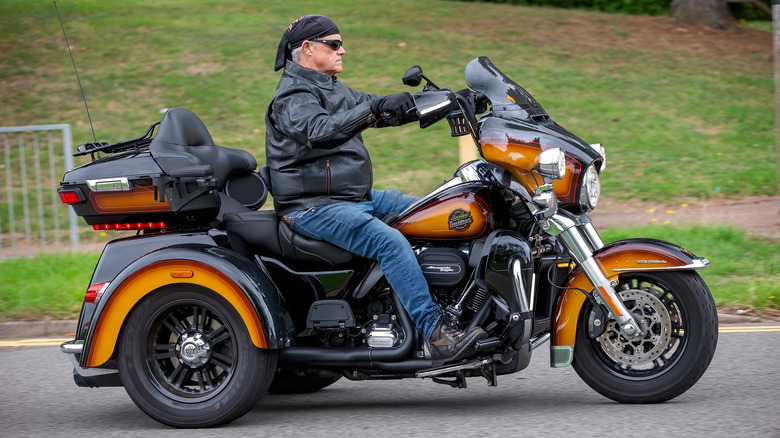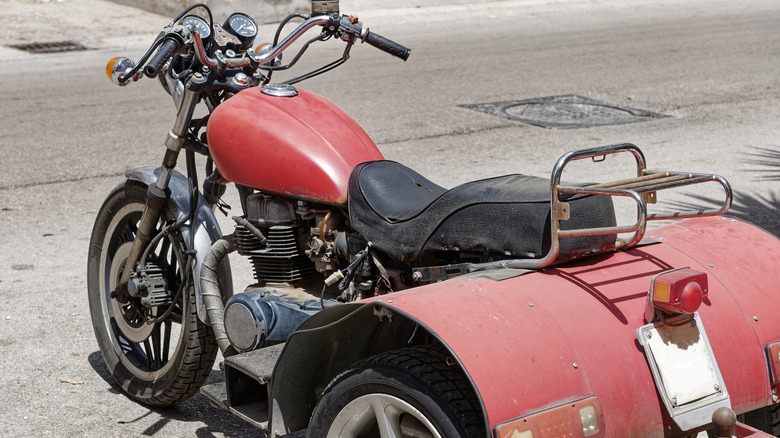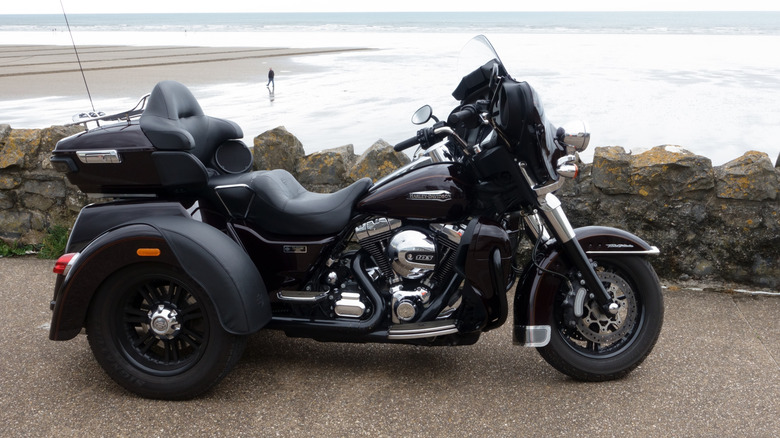Is A 3-Wheel Motorcycle Hard To Ride? Here's What Bikers Say
In the last decade or so, 3-wheel motorcycles, also known as trike motorcycles, have become steadily more popular on the roads of the world. While still not to the extent of regular motorcycles, it's a lot less unusual to see one cruising by you on the highway. There are 3-wheelers with surprisingly high horsepower, and more than a few made by big brands like Harley-Davidson. Despite the association with a kiddie bicycle, there's something appealing about 3-wheelers, whether it's their muscular backs or large wheels. It's a very "Road Warrior" image, and it's understandable to be drawn to one if you're considering taking up riding yourself.
However, in spite of that trike association, 3-wheelers aren't inherently easier to ride than traditional 2-wheel motorcycles. 3-wheelers do have some appealing points to seasoned riders, particularly in the comfort and general stability department, but they also have various risks and shortcomings, not to mention a distinct learning curve that can throw off both newcomers and veteran bikers. Whether or not a 3-wheeler is a good investment depends largely on who you ask, and as far as the biker opinions we've seen on the motorcycle subreddit and YouTube go, there are arguments to be made both for and against.
3-wheelers are appealing for their comfort and stability
According to YouTuber Sandman Rides, the biggest appeals to riding a 3-wheeler are comfort and stability. The obvious perk of three wheels over two is that you don't need to put any work into keeping the vehicle balanced, whether you're in motion or stopped. You just sit back and steer, and the whole thing keeps itself level. With the wider back also comes a wider seat, which makes it a little more comfortable on your back and rear to sit in for longer stretches. That wider seat also reduces the amount of exertion you need to put in with your waist and legs, which helps conserve stamina on a lengthy ride.
3-wheelers can be an especially convenient option for those with problems moving their lower backs, waists, or knees. The reduced physical commitment makes it a kind of riding option that more people can indulge in. As an added perk, 3-wheelers often have trunks or storage space built in, as opposed to the complete lack of native space on most traditional motorcycles.
It can be difficult for seasoned riders to re-learn riding for 3-wheelers
If you look into thoughts on 3-wheelers from motorcycle YouTubers and the users of the motorcycle subreddit, a word that comes up frequently is "weird." Due to the design of a 3-wheel motorcycle, you can't steer and maneuver it the same way you would a traditional motorcycle. You can't lean into your turns, and you can't countersteer the handlebars. Essentially, you need to steer a 3-wheeler the same way you would steer a car, which can be disorienting for seasoned riders who are already accustomed to steering the usual way. One Reddit user noted that, unlike a 2-wheeler, 3-wheeler motorcycles can't handle sharp turns at high speed nearly as well.
In fact, according to some Reddit users, one of the biggest risks that come from 3-wheelers is rolling. If you try to steer a 3-wheeler into the same kind of tight corner that you would a traditional motorcycle, you're more likely to end up flipping the entire thing on its side. Because the seat and rear are wider, it can also be a little more difficult to bail out of the bike in an emergency.
Essentially, riding a 3-wheeler isn't that difficult if you're relatively new to riding motorcycles. If you've already spent most of your life on traditional bikes, you'll have to break a lot of habits and learn a lot of new rules, which can be frustrating, and any skills learned on a 3-wheeler won't carry over to a traditional bike if you decide to switch.


